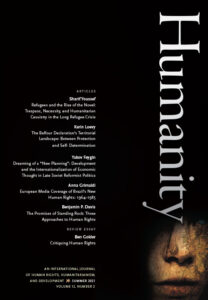HUMANITY, VOLUME 12, ISSUE 2
 Our latest issue of Humanity is out! It features essays on refugee theory and the necessity of trespass in Daniel Defoe’s A Journal of the Plague Year; the Balfour declaration as an instrument of imperial protection and Palestinian dispossession; late-Soviet economic thought and global debates over the role of state planning in development; the role of Brazilian Liberation Theology in framing Western European human rights media coverage of Brazil’s military dictatorship; the Standing Rock protests as offering a language of human rights not oriented towards the state; and a review of three recent books that theorize human rights in the face of critique.
Our latest issue of Humanity is out! It features essays on refugee theory and the necessity of trespass in Daniel Defoe’s A Journal of the Plague Year; the Balfour declaration as an instrument of imperial protection and Palestinian dispossession; late-Soviet economic thought and global debates over the role of state planning in development; the role of Brazilian Liberation Theology in framing Western European human rights media coverage of Brazil’s military dictatorship; the Standing Rock protests as offering a language of human rights not oriented towards the state; and a review of three recent books that theorize human rights in the face of critique.
TABLE OF CONTENTS
Abstract: The present-day legal theory of the refugee relies on Hannah Arendt’s famous phrase, “the right to have rights.” Yet Arendt also pointed to an earlier tradition of asylum-seeking. In this article, Professor Youssef explores early English novels’ historical association of refugees with the necessity that drives trespass. Examining the early Anglo-American novel in light of the Revocation of the Edict of Nantes, the essay tracks morally involuntary trespass in Daniel Defoe’s A Journal of the Plague Year (1722) to argue that the novel models
Read More »
Abstract: Famously declaring British support for the establishment of a Jewish “national home” in Palestine, the Balfour declaration (November 1917) is commonly understood as the first international instrument recognizing the right to self-determination for the Jewish people in Palestine. But the territorial framework that the drafters of the declaration envisioned drew on nineteenth-century practices of imperial protection that sustained both rule and expansion in multi-national empires. Reframing the Balfour declaration as an instrument of protection, the article contributes to the study of the colonial context
Read More »
Abstract: This paper argues that the trajectory of late-Soviet economic thought must be understood in the context of a larger global discourse on the proper role of state planning in the context of development. This debate was born out of a disappointment with the development planning that had dominated prescriptions of economists and policy entrepreneurs on both sides of the Iron Curtain. Faced with the failures of economic development in the “Third World” and a socio-economic crisis in “industrial societies” these intellectuals attempted to invent
Read More »
Abstract: Drawing from a study of Brazilians’ interactions with the transnational human rights movements and advocacy networks of the 1960s-1980s, this paper discusses the channels through which Brazilians’ concerns for rights and development during their military dictatorship reached audiences of national newspapers in Belgium, France, the UK, and Switzerland. It reveals, to a previously unacknowledged degree, the significant role played by Brazilian Liberation Theology in framing the country’s human rights struggles, and points to various ways that local environments and institutions influenced the framing of
Read More »
Abstract: Any appeal to a right raises the question of a corresponding duty. If one bears a right, then who bears the duty to respect, protect, and enforce that right? In this essay, I contend that human rights claims need not be oriented to or reliant on the state. I start from and conclude with lessons from the 2016 protests at Standing Rock. Standing Rock, I argue, exemplifies critical theory that organizes communities through the language of human rights.
Read More »
Abstract: This essay reviews three recent books which each provide a different account of human rights and their critics. Jean-Yves Pranchère and Justine Lacroix’s Human Rights on Trial constructs a genealogy of critiques of human rights discourse from the late eighteenth century to the present day. Joe Hoover’s Reconstructing Human Rights proposes a critically redemptive approach to human rights, pushing human rights further leftward through the resources of pragmatism and agonistic theories of democracy. But it is ultimately Ratna Kapur’s Freedom in a Fishbowl that
Read More »
 Our latest issue of Humanity is out! It features essays on refugee theory and the necessity of trespass in Daniel Defoe’s A Journal of the Plague Year; the Balfour declaration as an instrument of imperial protection and Palestinian dispossession; late-Soviet economic thought and global debates over the role of state planning in development; the role of Brazilian Liberation Theology in framing Western European human rights media coverage of Brazil’s military dictatorship; the Standing Rock protests as offering a language of human rights not oriented towards the state; and a review of three recent books that theorize human rights in the face of critique.
Our latest issue of Humanity is out! It features essays on refugee theory and the necessity of trespass in Daniel Defoe’s A Journal of the Plague Year; the Balfour declaration as an instrument of imperial protection and Palestinian dispossession; late-Soviet economic thought and global debates over the role of state planning in development; the role of Brazilian Liberation Theology in framing Western European human rights media coverage of Brazil’s military dictatorship; the Standing Rock protests as offering a language of human rights not oriented towards the state; and a review of three recent books that theorize human rights in the face of critique.